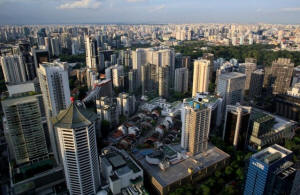|
Airbnb pushes back on Singapore's tough
home rental rules
 Send a link to a friend
Send a link to a friend
 [December 08, 2017]
By Aradhana Aravindan and John Geddie [December 08, 2017]
By Aradhana Aravindan and John Geddie
SINGAPORE (Reuters) - Short-term home
rental service Airbnb on Friday called Singapore's regulatory framework
"untenable" as authorities said they planned to hold discussions with
home-sharing platforms and resident groups soon on how such
accommodation may be allowed.
The reaction by Airbnb to the latest regulatory hurdle came amid its
efforts to work with authorities around the world keen to minimize its
impact on private housing and the hotel industry.
While Singapore has been an early adopter of the sharing economy, it has
strict rules regarding property rentals in the city-state and charged
two men with unauthorized short-term letting of apartments earlier this
week.
"The current framework is untenable and does not reflect how
Singaporeans travel or use their home today," Airbnb said on Friday in a
statement addressing Singapore's regulations.

"Nearly three years since the URA's first public consultation, it's
disappointing that the discussion has not moved forward," it said,
referring to the Urban Redevelopment Authority.
Private homes in Singapore are subject to a minimum stay of three
consecutive months, under rules revised earlier this year, and cannot
accommodate transient occupants.
While saying there was space for short-term accommodation in Singapore,
the URA told Reuters the government will review and consider safeguards
to ensure it does not negatively affect the "amenity" of residential
estates.
It said it would soon start a public consultation on the matter. A
previous consultation in 2015 did not reach a clear consensus on
short-term rentals.
Airbnb may be conscious of the knock-on effect that Singapore's tough
stance may have on other cities in the region, said Brian King,
associate dean of the School of Hotel and Tourism Management at Hong
Kong Polytechnic University.
"They may be feeling like they need to take a slightly more aggressive
stance this time to avoid this leading to crackdowns elsewhere," King
said.
This week, Singapore charged two men with unauthorized short-term
letting of four apartments in the first such prosecution. If found
guilty, the two are liable to a fine of up to S$200,000 ($148,150) per
offence.
The rentals were arranged through Airbnb, which was not referred to in
court documents.

[to top of second column]
|

Singapore's skyline is seen June 17, 2017. REUTERS/Thomas
White/File Photo

In a message seen by Reuters, Airbnb this week alerted hosts in
Singapore to the court case and asked them to "share" their reason for
hosting and why it is important the government pass laws that permit
short-term home sharing.
Airbnb, which matches people wishing to rent out all or part of
their homes to temporary guests, said it has 8,700 listings in the
city-state. Singapore has high population density, and its limited
land area means a majority of the 5.6 million people live in
apartments.
HUNDREDS INVESTIGATED
The URA said part of the public consultation will involve working
with key stakeholders such as representatives of home-sharing
platforms, resident groups and other accommodation providers.
The planning agency said it investigated 985 cases of unauthorized
short-term accommodation in private homes in 2015 and 2016, and
about 750 cases in 2017's first 11 months.
The firm, founded in 2008 in San Francisco, has clashed with
hoteliers and authorities in cities including New York, Amsterdam,
Berlin and Paris, which in some cases are limiting short-term
rentals. Critics accuse Airbnb of exacerbating housing shortages and
driving out lower-income residents.
One host in Singapore, who has listed on Airbnb for the past two
years after failing to find a long-term tenant and uses the income
to pay the mortgage, is considering pulling the apartment from
Airbnb's website due to the authority's increased scrutiny.

"I am worried that I will have an empty apartment sitting there,
that is not going to generate any income," said the person, who
spoke to Reuters on the condition of anonymity. "Any income that I
earn doesn't justify this kind of risk."
(Reporting by Aradhana Aravindan and John Geddie; Additional
reporting by Jeremy Wagstaff; Editing by Richard Borsuk and
Christopher Cushing)
[© 2017 Thomson Reuters. All rights
reserved.]
Copyright 2017 Reuters. All rights reserved. This material may not be published,
broadcast, rewritten or redistributed. |